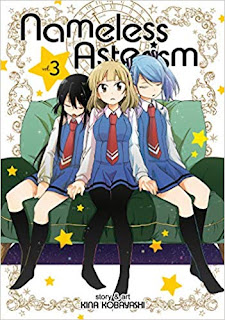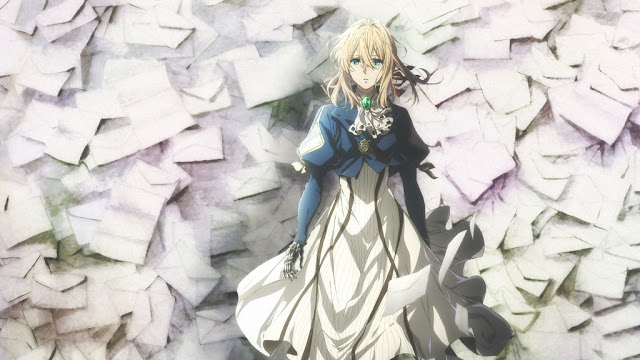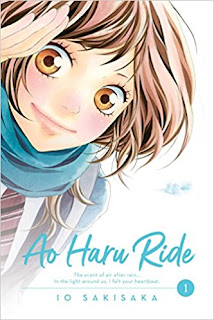Volume 3 spends most of its time focusing on Subaru, the brother of main character Tsukasa, as he tries to convince another boy not to fall for his twin sister. The majority of the volume thus ignores our three heroines, Tsukasa, Washio, and Kotooka. That's too bad.
Sadly, Kobayashi-sensei is still heavily using Subaru's cross dressing more for comedy and forced misunderstandings than for any meaningful exploration of gender. This volume provides more background on why he cross-dresses and it isn't fulfilling or realistic in the least. I don't need everything to be realistic, but it should have some emotional resonance or rationale. I still find the use of cross-dressing to be a plot device here, not an authentic character trait, that's disappointing.
Further, I didn't want to spend most of the volume on the two male side characters when what I care about is the love triangle of our three female leads, but that's what this volume does. The highlight of the volume for me was seeing Kotooka realize that things can't stand as they are. However, despite one half-hearted attempt to talk to her friends, that doesn't go anywhere (yet?). It ends up being a full volume of nothing actually changing between the three.
I also can't decide if this series is a comedy, a drama, a romance, or some combination. The tone just hasn't settled in over the three volumes. There are funny moments, cute moments, dramatic feelings, looks of longing, but nothing that ties those together as a cohesive narrative voice.
In other hands, the story of a love triangle, particularly one where A loves B, B loves C, and C loves A could be the source of rich melodrama and ultimate bittersweet endings: as at most, no more than two of the three can be together, if any at all. This is a story I would love to see explored with real emotional veracity.
However here, I struggle to see how this series could end in a satisfactory way (satisfactory doesn't necessarily mean happy, just plausible and emotionally cohesive). The rapid mix of comedy and longing doesn't seem to suggest a way out that will have resonance.
As I mentioned before, I'm really afraid the series will end with a non-resolution, like "oh, let's all just be friends" rather than someone actually being hurt. Even having all three realize that middle-school crushes are only that and each meeting someone else in high-school or adulthood would be more realistic. But the comedic undertones suggest it won't be that thoughtful and instead we won't get the bittersweet, or painful, ending we and the characters deserve. However, hope springs eternal and maybe Kobayashi-sensei has something poignant in mind.
The art continues in fairly typical moe-ish style with pretty minimal backgrounds and serviceable, if not exactly my style character designs. I just wasn't thrilled with this volume's lack of plot development and even less happy with its continuing use of a gender non-conforming character as an inauthentic plot device. Subaru is not the mirror for trans/gender-non-conforming people that readers deserve. Haven't we moved beyond using cross-dressing as a plot device to create hijinks?
I'm giving this a barely 6/10 because its mostly inoffensive and for those who like the overall style of art and story, it'll be fine, but it's just sort of doing its thing passively.
✩🚺








